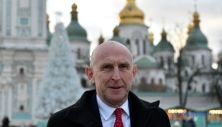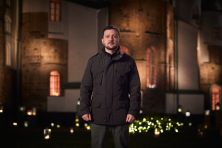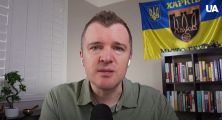Angry at a corrupt, coercive system of military conscription, or simply unwilling to fight, many Ukrainian men are paying their way past a ban on...
Vous n'êtes pas connecté
- English
- Français
- عربي
- Español
- Deutsch
- Português
- русский язык
- Català
- Italiano
- Nederlands, Vlaams
- Norsk
- فارسی
- বাংলা
- اردو
- Azərbaycan dili
- Bahasa Indonesia
- Հայերեն
- Ελληνικά
- Bosanski jezik
- українська мова
- Íslenska
- Türkmen, Түркмен
- Türkçe
- Shqip
- Eesti keel
- magyar
- Қазақ тілі
- Kalaallisut ; kalaallit oqaasii
- Lietuvių kalba
- Latviešu valoda
- македонски јазик
- Монгол
- Bahasa Melayu ; بهاس ملايو
- ဗမာစာ
- Slovenščina
- тоҷикӣ ; toğikī ; تاجیکی
- ไทย
- O'zbek ; Ўзбек ; أۇزبېك
- Tiếng Việt
- ភាសាខ្មែរ
- རྫོང་ཁ
- Soomaaliga ; af Soomaali
Rubriques :
 Maroc - EURASIAREVIEW.COM - A la une - Hier 00:12
Maroc - EURASIAREVIEW.COM - A la une - Hier 00:12
45 Days In Ukraine, 1,000 Days In War – Essay
By Kaspars Ģērmanis (FPRI) -- The title of this essay would have been a little bit different if I had spent five more days in Odesa as planned. “50 days in Ukraine, 1,005 days in war.” That would be a neat summary of my time in the country, where I visited several cities and experienced everyday life. That’s what this essay is about: personal feelings in a country engulfed in war. However, because of the Russian air attack on Odesa on November 18, I changed my plans. I left Ukraine on November 19 — the 1,000th day since the full-scale war began on February 24, 2022. I left not so much out of fear — I was already used to the sirens warning of air alerts, and I had experienced the attacks of the Iranian Shahed drones. Odesans themselves told me not to stay, and I guess I understand why. They have seen and experienced too much to watch others take unnecessary risks. It’s not about courage anymore; it is about living in permanent stress, where one grows tired of heroism, courage, and killing. Nobody talks about these qualities. There is just a wish to have a normal life. A Brief Introduction About Myself and Ukraine This was my sixth and longest visit to Ukraine, and my second during the full-scale war. My story with Ukraine started when I was around 13 years old. I played ice hockey, and my team participated in the Eastern European Hockey League competitions. Latvian, Belarusian, and Ukrainian teams took part in this tournament once a year, and we went to Kyiv. Back in Latvia, people asked me how it was: “Did you like Ukraine?” I answered, “Yes,” and it was an honest answer. Later, as a volunteer in Switzerland, I met other Ukrainians with whom I still have very friendly relationships. When Russia annexed Crimea in 2014 and started a war in Donbas — eastern Ukraine — it seemed unbelievable. A war in Europe? In the same Europe that, after WWII, despite the war in the Balkans in the 1990s, continued to insist on the principle of “never again”? Sure, it was “other Europe,” not pacifistic Western Europe, but still. February 24, 2022, was unbelievable for Ukrainians. Some remember thinking that Russia would only attack the eastern part of Ukraine to enlarge territories already ruled by the Kremlin. Despite the Russian army being concentrated on three sides of Ukraine — from Belarus, Crimea, and the border with Russia — most people I spoke to did not believe a full-scale war would occur. First, Ukraine and Russia share close ties. On a personal level, many have relatives in Russia, and vice versa. Now Ukrainians hate this phrase, but for a long time, both nations were referred to as “brother nations.” As one of my acquaintances in Kyiv said, ironically, “Our brother — or as they called themselves, ‘the big brother’ — attacked us.” Second, it seemed unbelievable that war had begun. In Russia, Ukraine, the Baltic countries, and Belarus, the generation that experienced WWII used to say that the worst that could ever happen is war — it is a saying well-known to succeeding generations. Thus, the idea of war had become something unthinkable. In 2022, I wanted to help Ukraine but did not know how. Just going to Ukraine without a clear plan and doing something for the sake of doing it would be silly. I had not visited my friends in Ukraine because I did not want to appear as a “catastrophe tourist.” I didn’t want to be one of those people who observes others’ tragedies and then returns to his safe country, home, job, and comfortable everyday life. If I can do nothing, I have no reason to be in Ukraine. However, in November and December 2023, I visited Lviv for two weeks. This is the largest western Ukrainian city and one of the largest cities in Ukraine, located near the border with Poland. Ukrainians encouraged me to come again because it is nice to see foreigners in Ukraine. Besides, the situation in Lviv is relatively calm. The experience stayed with me, so in the summer I decided again to leave for Ukraine. The Think Tank Approach and Trump Perspective My colleagues at the Center for Geopolitical Studies in Riga supported my most recent trip to the country. They suggested creating a network of Latvian-Ukrainian think tanks — “LatUkrNet” (“Latvian–Ukrainian Network”) — intended to bring Ukraine closer to the West, the European Union, and NATO. My visit began in Kyiv, where I met representatives from eight organizations, most of which are Ukrainian think tanks in various fields: international politics, economics, legal affairs, law, the fight against fake news and disinformation, forensics, social psychology, and political psychology. All of them are eager to bring Ukraine closer to the Western world. The Center for Geopolitical Studies in Riga is happy to implement various research projects, invite Ukrainian experts to Latvia for conferences and to work with Latvian students, and help establish cooperation with other Latvian institutions or NGOs. This is how we at the Center for Geopolitical Studies can support Ukraine during these times. We hope for the best results. Who else can help Ukraine? Europe, the United States, or more specifically, Donald Trump, who recently reclaimed his position as US president-elect? It seems that Ukrainians do not know what to expect from Trump. One woman just shakes her head when she hears his name. “What’s the difference? This war will never end,” she says, finding solace in religion. “If there is someone who prays for you, everything will be good, even if you have to stay in Odesa,” she indicates to me. Another perspective heard in Ukraine is that Trump is better than the Democrats. True, he is unpredictable, but both attacks in 2014 and 2022 on Ukraine occurred under Democratic presidents: Barack Obama and Joe Biden, respectively. Opinions that the Democrats are too soft and unable to respond with a “fist against fist” approach in international politics can sometimes be heard. There is hope that Trump can confront Russian dictator Vladimir Putin in a way that he understands better. In Eastern Europe, discussions and compromises can be viewed as signs of weakness and cowardice. In Lviv, I did not hear a single air raid for about a week before the US presidential election. On November 6, there were three of them. However, this was the exception. I stayed in Lviv until November 16, and the situation was quite calm. The Different Faces of War In regions where war is distant, life seems similar to peacetime, but this is just a mirage. In many cities and towns, there are memorial alleys with photos of fallen soldiers and fields of graves decorated with Ukrainian blue-yellow, Ukrainian Insurgent Army (Ukrainska Povstanska Armiya) red-black, and battalion flags. Pubs, at least officially, are open until 11 pm, and the number of soccer fans attending games is very limited, to avoid giving Russia a reason to launch rockets and kill a large crowd. In Kyiv and Lviv, people go to pubs, performers of popular songs entertain in the squares, and young people enjoy life by drinking beer in parks. Occasionally, stark contrasts in experiences appear: One side is at war, and due to a shortage of soldiers, has few opportunities to return home for a respite or troop rotation, while the other side “lives as before.” This question particularly concerns men. There are checkpoints on the streets and highways that stop men and check documents to determine why they are not in the military. I was also stopped several times, but when they saw my Latvian passport, their interest disappeared. However, those away from the battlefields also do what they can to support Ukraine. They search for vehicles in Europe for the army, donate money or goods, or build drones. In Uzhhorod, a city on the border with Slovakia, the pastor prays for local men who have gone to war, as well as for cities that have endured further rocket fire: Sumy, Kharkiv, Dnipro, and other locations. However, the chance to go to the pub and watch a soccer match while sitting in a tree or standing behind the stadium fence, due to the attendance limit, is a source of power and strength to keep resisting and fighting. There is also humor — though often it’s dark humor. “Don’t forget to take a flashlight,” writes one of the leaders of a Kyiv think tank that joined “LatUkrNet.” When Russians destroy the city’s energy system, the public lighting stops working. In Odesa, after attacks, electricity can go out for hours; however, the internet works autonomously for five hours, explains a resident. Everything Ends Quickly in Odesa In Uzhhorod, where air raids are rare, I visited the shelter for the first time. I witnessed an argument between the train station administrator and a woman from Odesa who did not want to go to the shelter. She says she is used to the anxiety of the air raid siren because it is common in Odesa. The administrator stands firm, and both the Odesa woman and I end up in the shelter. Noticing that I speak very little Ukrainian, she asks if I speak Russian. Yes, I do, but I avoid doing so in Ukraine. The Odesa woman replies in a friendly yet proud manner, saying, “All Ukrainians know Russian.” Another observation: In Kyiv, especially in Lviv and Uzhhorod, people refuse to speak Russian. Locals tend to be very definite — this is the language of the enemy. Even those who did not know English responded kindly and with a smile … in Ukrainian. I understood this attitude; it was not personal. A few hours before traveling by train to Odesa from Uzhhorod, I found out that there had been a rocket attack on Odesa. Like other Eastern and Southern Ukrainian cities, Odesa is more often targeted by missiles than Western regions. Later, it became known that 10 people were killed and even more were injured. While everything was calm in Lviv and Uzhhorod, and also in Kyiv, except for a couple of distant shootings near my guesthouse with Iranian Shaheds, the attack in Odesa reminded me of a harsher everyday life. The proud but kind woman from Odesa, along with other locals, advised me to leave Odesa immediately. The owner of the Airbnb apartment, with whom I had already made arrangements, also recommended that I go and return when the situation is better. I understood that I had no reason to stay in Odesa. I was in Kyiv for work and to see some friends, and in Lviv to meet friends and attend to some duties. Uzhhorod? My curiosity. But Odesa? I had heard a lot about this great city. In other words, curiosity also played a part. “You are welcome, but next time,” I heard from the locals. As I already wrote, if I cannot be useful, then there is no point in staying and watching other people’s tragedies. Odesans would like to be in my place because I had a chance to leave. And I left. But I hope to return — both to Odesa and to Ukraine. I truly hope so. About the author: Kaspars Ģērmanis is a researcher at the Center for Geopolitical Studies in Riga. He has two decades of experience in journalism, working both for Latvian and foreign media, with a focus on domestic political news, foreign affairs, and economics. Source: This article was published by FPRI
Articles similaires
Putin Sends Signals To The West On Ukraine Ahead Of Trump’s New Term – Analysis
By Steve Gutterman (RFE/RL) -- Vladimir Putin’s end-of-year Q&A session with reporters and the public is billed as a chance for Russian...
Only Ukrainians to decide when to start peace talks – UK Defense Minister
Ukraine, as the nation fighting against Russian aggression, holds the sole authority to decide when to begin negotiations to resolve the...
The President of Ukraine’s Christmas greeting
This is how light sounds. This is how a miracle sounds. This is how life sounds. This is how Christmas sounds. Our "Shchedryk". Our Leontovych. Our...
Paul Niland: How to Save Ukraine from Putin’s Occupation?
As the time of Trump is near, the world is actively discussing possible peace discussions between Ukraine and Russia. But what peace can be with...
Kuleba: The only way to prevent Ukraine’s future war with Russia is its accession to NATO
Former Ukrainian Foreign Minister Dmytro Kuleba has said that Ukraine may start a revenge war against Russia in the future if it does not become a...
What A Ukraine Peace Plan Could Look Like – Analysis
By Mike Eckel (RFE/RL) -- Behind closed doors in Moscow, Kyiv, Brussels, Washington, and other capitals, diplomats, elected leaders, and military...
Jake Broe on UATV: What if Putin Dies Tomorrow?
Apocalypse, now or later. Trump talks badly but acts well for Ukraine. Will Trump accept a ceasefire without security guarantees? If Putin dies...
What Would The Russian Capture Of Pokrovsk Mean For The Ukraine War? – Analysis
By Todd Prince and Oleksiy Prodayvoda (RFE/RL) -- Pokrovsk once buzzed with life, but on this cold, snowy December day, it feels like a ghost...
Coordination of Efforts with Partners, Progress in Historical Issues and Support on the Path to the EU and NATO – Outcomes of the Meeting Between the President of Ukraine and the Prime Minister of Poland
In Lviv, President of Ukraine Volodymyr Zelenskyy held talks with Prime Minister of Poland Donald Tusk on coordination of efforts with partners,...
Les derniers communiqués
-
Adobe Brings Conversational AI to Trillions of PDFs with the New AI Assistant in Reader and Acrobat
Adobe - 21/02/2024
-
Laura Frigenti takes the Helm as Chief Executive Officer of the Global Partnership for Education
Global Partnership for Education - 05/12/2022





